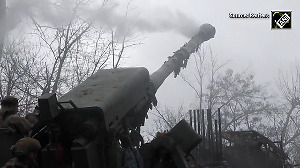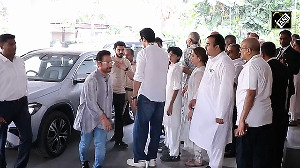 Pakistan's response to India's "wishlist" with regard to those behind 2008 Mumbai terror attacks is "critical" to "substantive movement" in the bilateral dialogue, External Affairs Minister Salman Khurshid said on Sunday.
Pakistan's response to India's "wishlist" with regard to those behind 2008 Mumbai terror attacks is "critical" to "substantive movement" in the bilateral dialogue, External Affairs Minister Salman Khurshid said on Sunday.
What Islamabad has done so far about it is "not to our satisfaction", he told PTI in an interview while taking stock of the Indo-Pak ties in the year gone by.
Khurshid did not see controversial statements made by Pakistan Interior Minister Rehman Malik while in India recently as a "setback" in the dialogue process.
What is said or what gesture is made is not "critical", he said.
"I don't see it as a setback at all. But I do believe and (what) we all believe in this country is that dialogue will move smoothly, faster and in a right direction provided the wishlist lying with Pakistan given by India as far as Mumbai tragedy is concerned is responded to. That is a critical thing, not what is said, not what gesture is made.
"Ultimately it is the delivery of the fundamental aspects that are required to be fulfilled...Unless that is done, we will not have substantive movement. And it has not been done to satisfaction," the minister said.
Asked about delay in Pakistan granting Most Favoured Nation status to India, Khurshid said India will do whatever needs to be done to persuade them to move on this.
"We believe that it should have been done. We will do whatever needs to be done to persuade them that we should now be able to do it. It is not something which should be delayed indefinitely. It is not something we should just forget that it happened.
"We have to get them back on track. If they have problems, they will certainly express them to us and obviously when it was being negotiated, they must have factored in all the different pulls and pushes, but we would like it to be moved forward and we will certainly persuade them to do so," the minister said, while asserting the issue "is always on the agenda".
Khurshid also dismissed the assessment of some in India that Pakistan army was behind the delay in granting MFN status to India.
Pakistan has delayed the grant of MNF status to India along with abolition of a negative trade list regime "for a short time" because of reservations expressed by several industries, according to Pakistan Commerce Minister Makhdoom Amin Fahim.
In a wide-ranging interview which included India's relationship with other countries such as Iran, China, Maldives, Bangladesh and Mauritius, Khurshid asserted that all countries provided "opportunities" to the country and not "challenges".
Admitting that at times India has to deal with difficult issues such as imposition of sanctions against Iran, Khurshid said in such situations, the country takes a "principled" stand.
"Iran is a difficult issue, when somebody imposes sanctions on Iran as part of the UN's (sanctions) and then unilateral sanctions are imposed, then what should we do. So we take a principled position. We stand by the UN-imposed sanctions.
"Comply with those sanctions but we are not going to give up our friendship with Iran because our friendship is much longer lasting and sustainable relationship which should not be completely knocked out by the compliance of present sanctions imposed by the UN. We must let the UN know that it cannot be at our friendship," the minister said.
He also noted that "there is a principled balancing to be done which is a difficult thing".
On India-China bilateral ties, the minister said China was important to the country as partners.
"China is a partner, it can be a collaborator, it can be a competitor", Khurshid said, adding, "Because Asia's role will be defined by India and China and to that extent, the big league game is with China. The other lesser league game is with Pakistan.
"We need good relationship with Pakistan. So, we wish Pakistan well. We want Pakistan to prosper. We want Pakistan to be peaceful because we believe those are the circumstances in which we have a best chance of working closely with Pakistan... We are not accompanied by Pakistan at the high table, we are accompanied by China."
Talking about his priorities in the year, the minister said, "Priority frankly is to carry public opinion to support the opportunities we have abroad. We must get 'aam admi' (common man) connected with the foreign policy" while noting that in past leaders like Jawaharlal Nehru, Franklin D Roosevelt and Indira Gandhi were able to do so.










 © 2025
© 2025